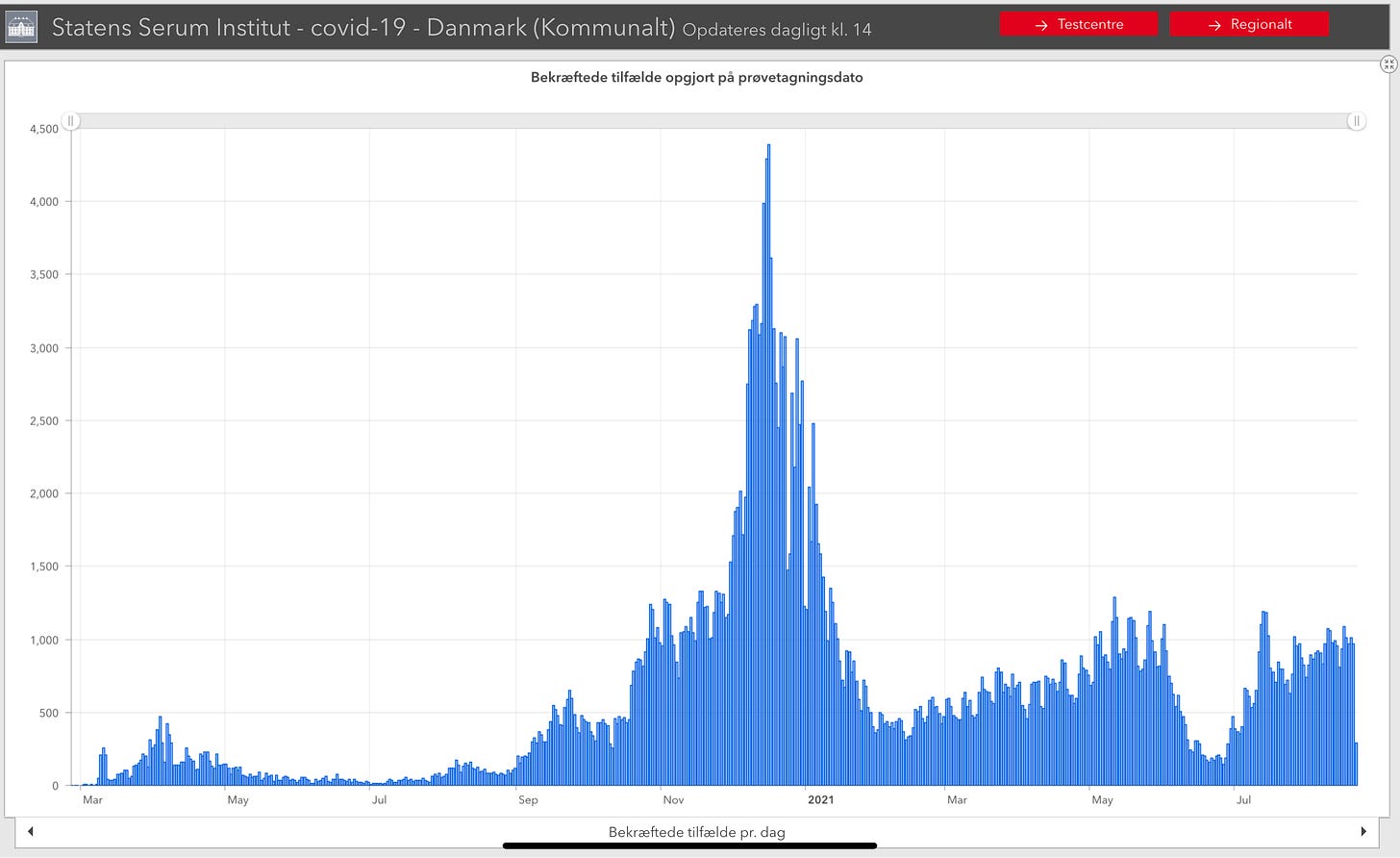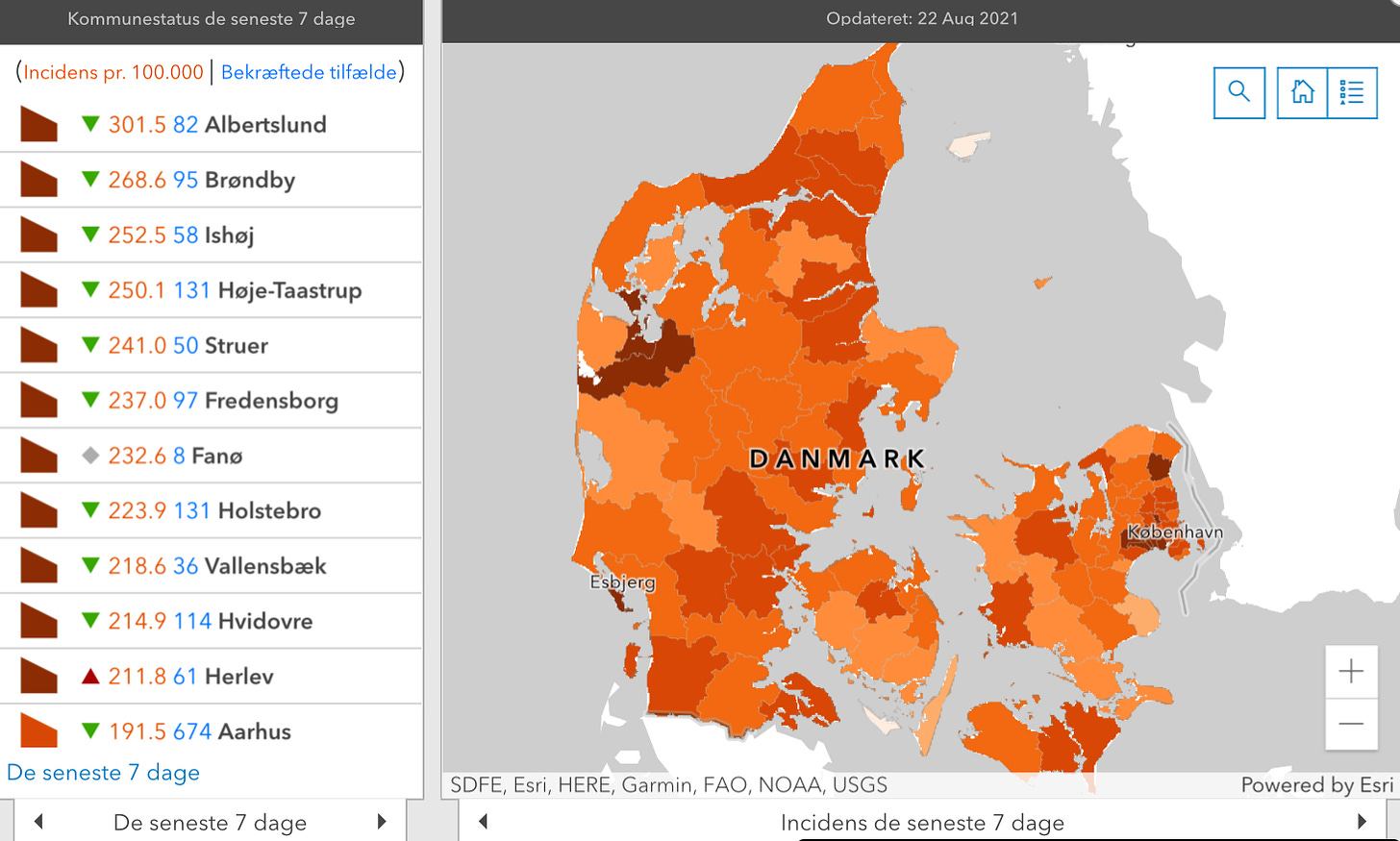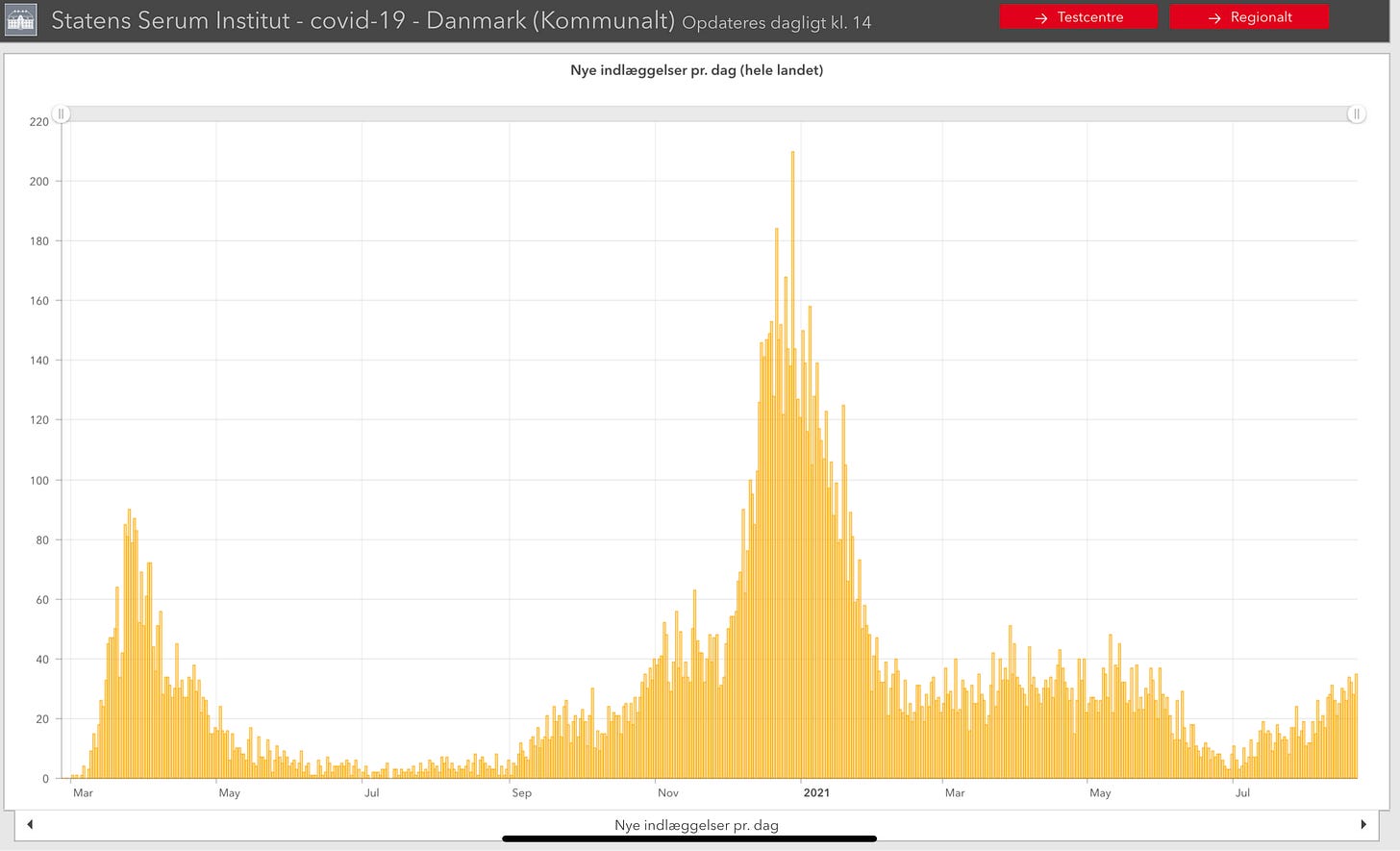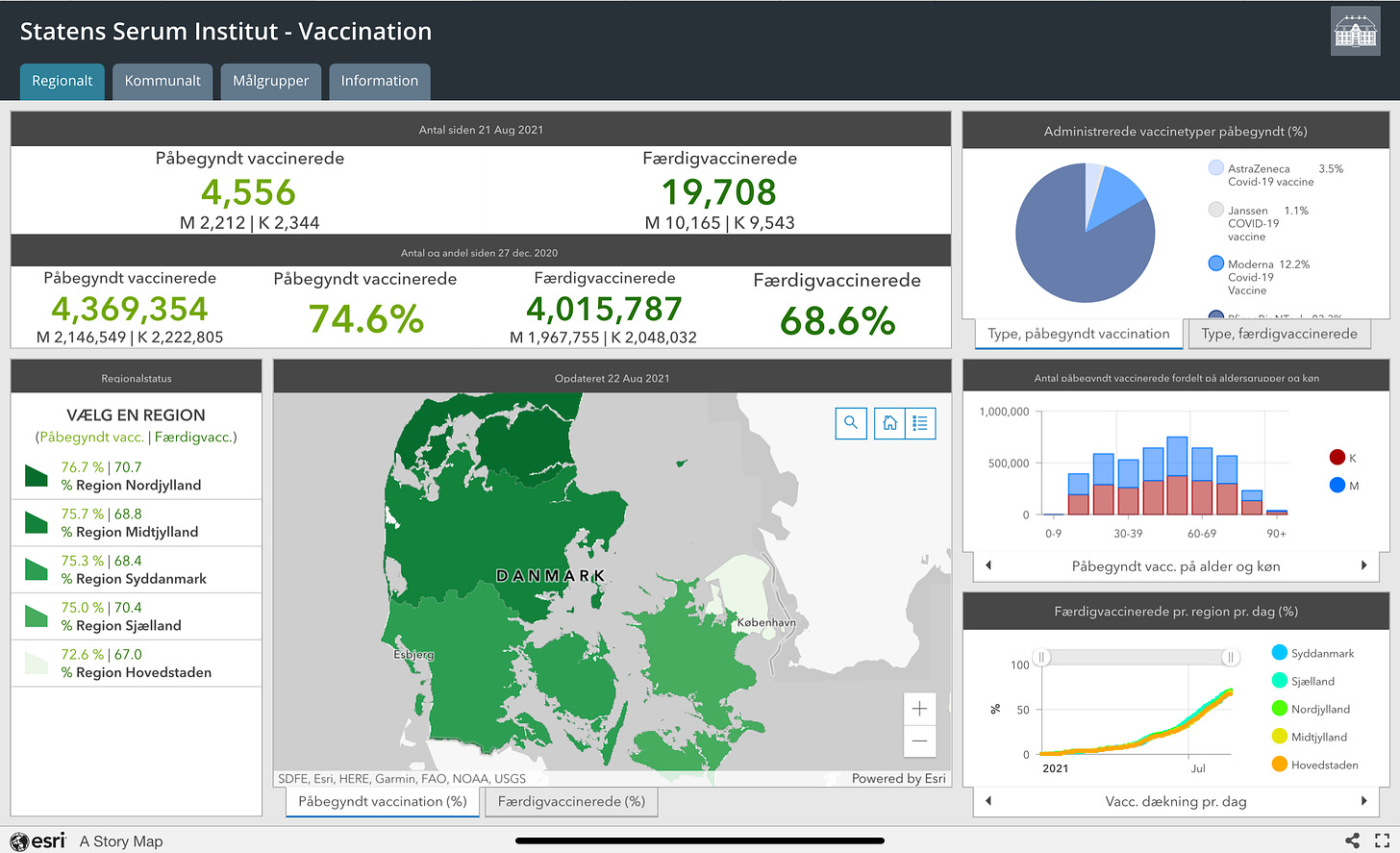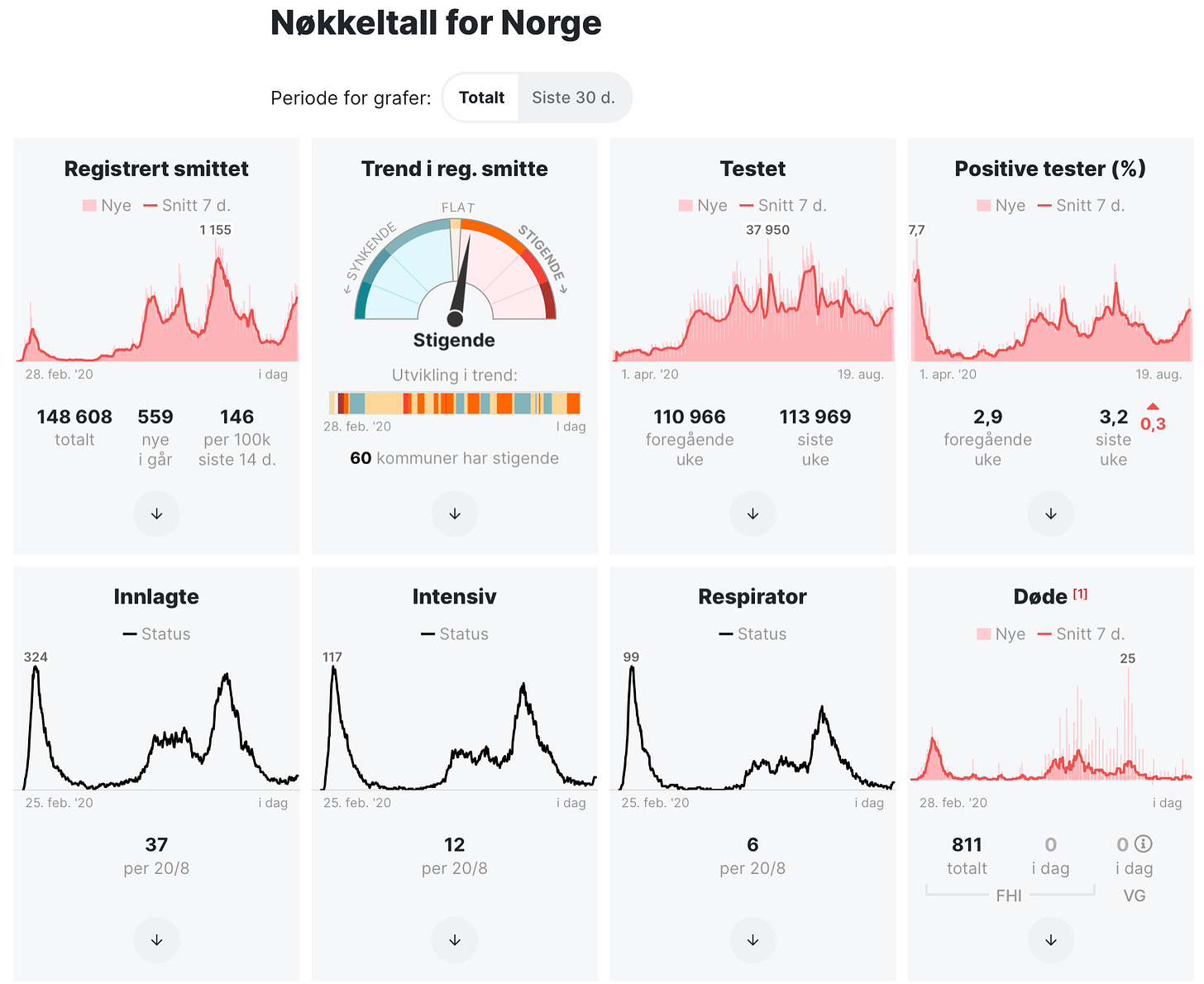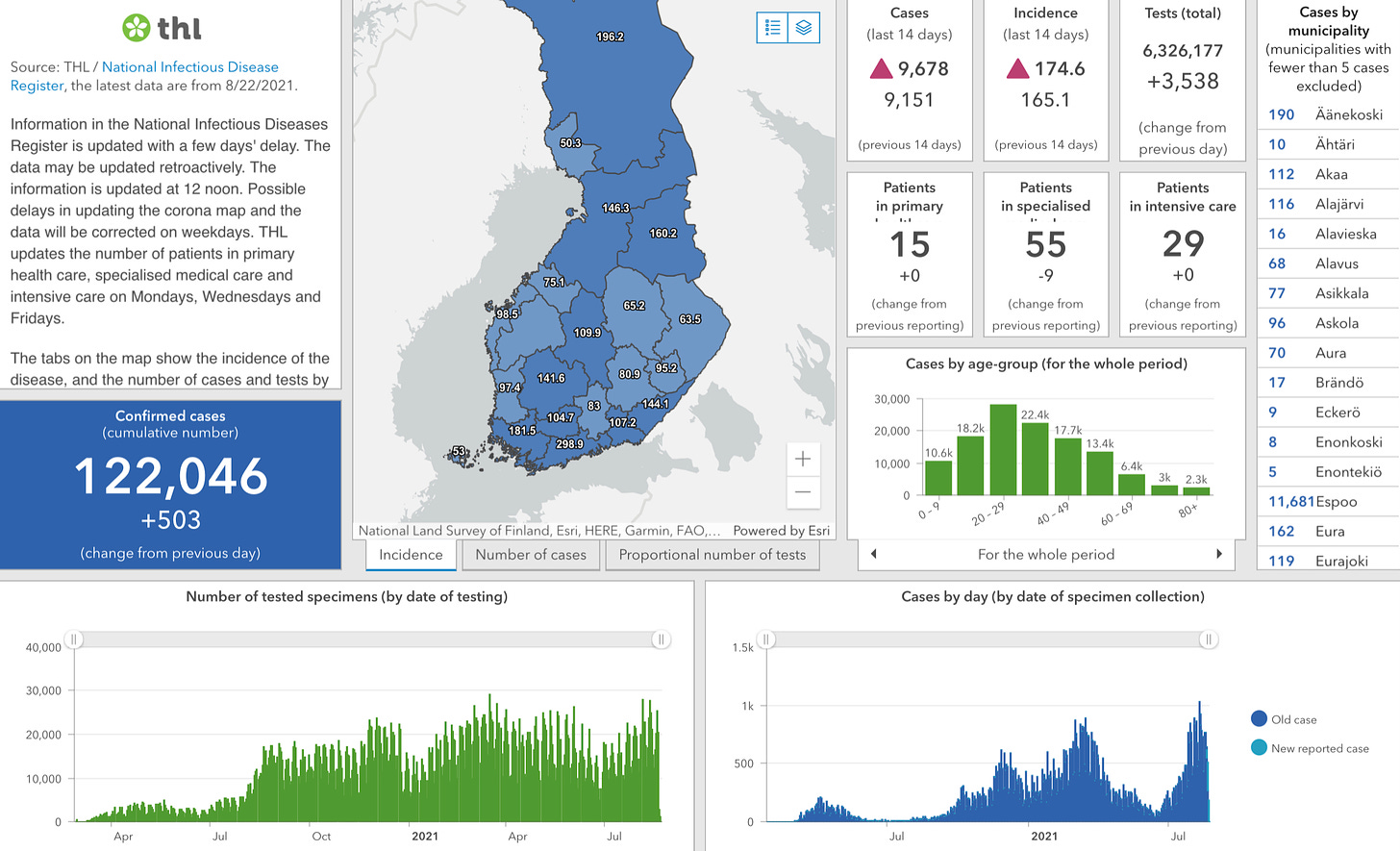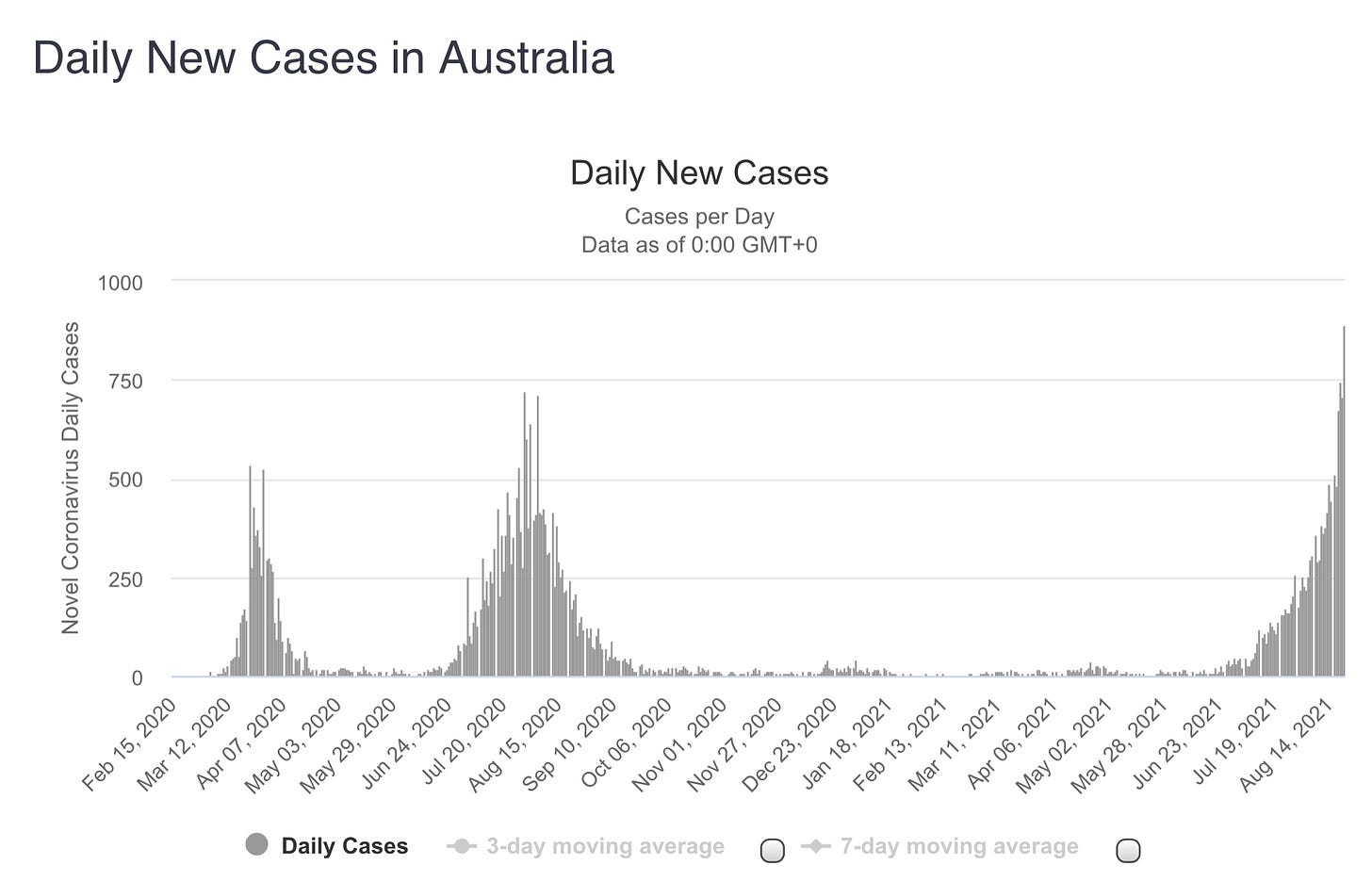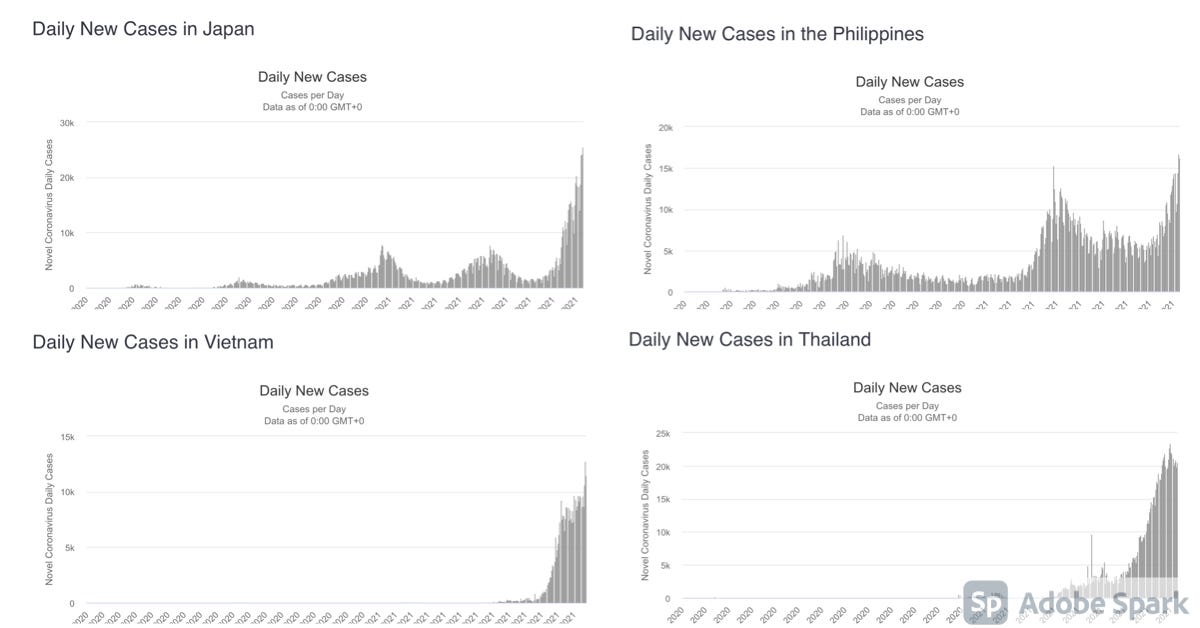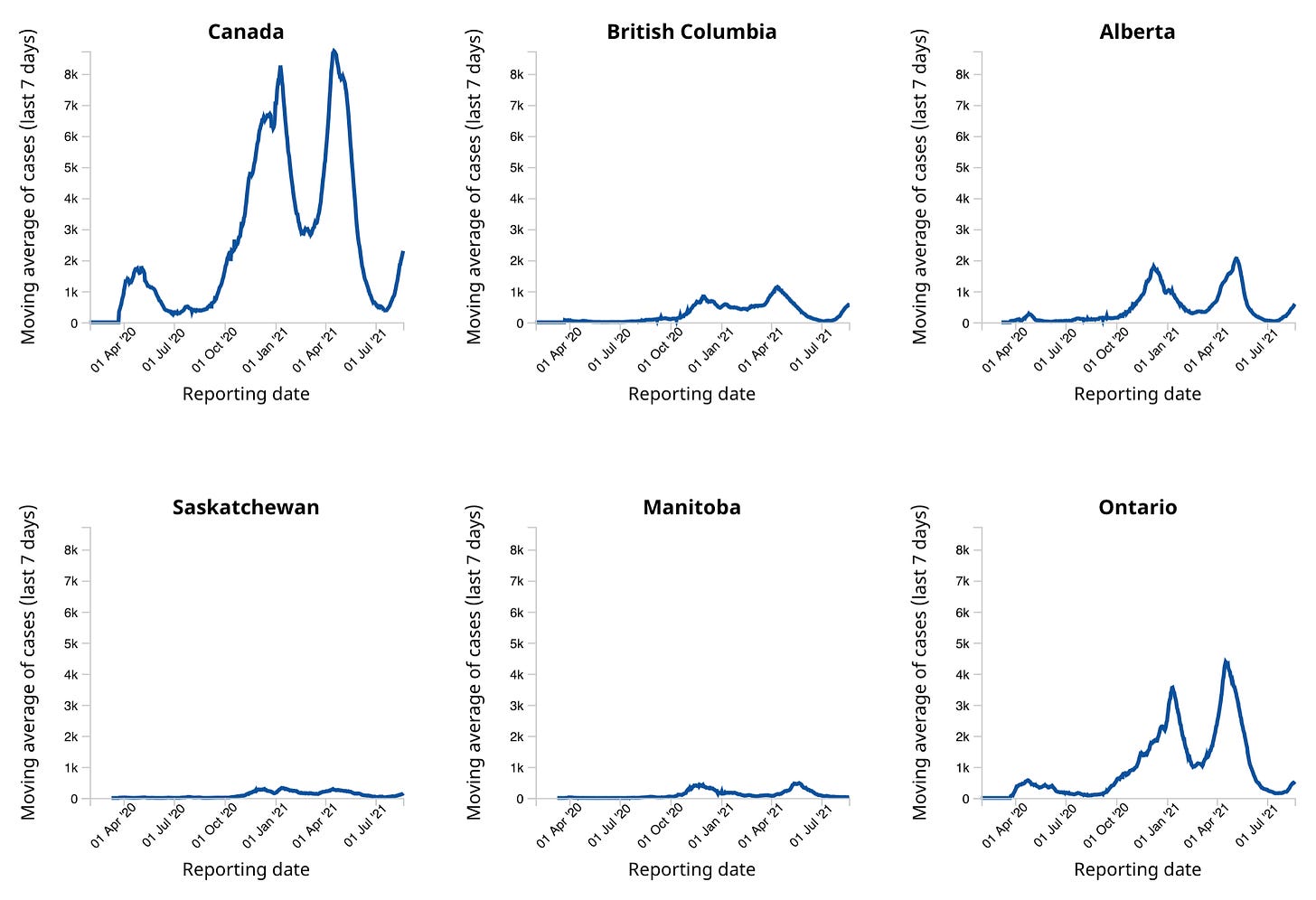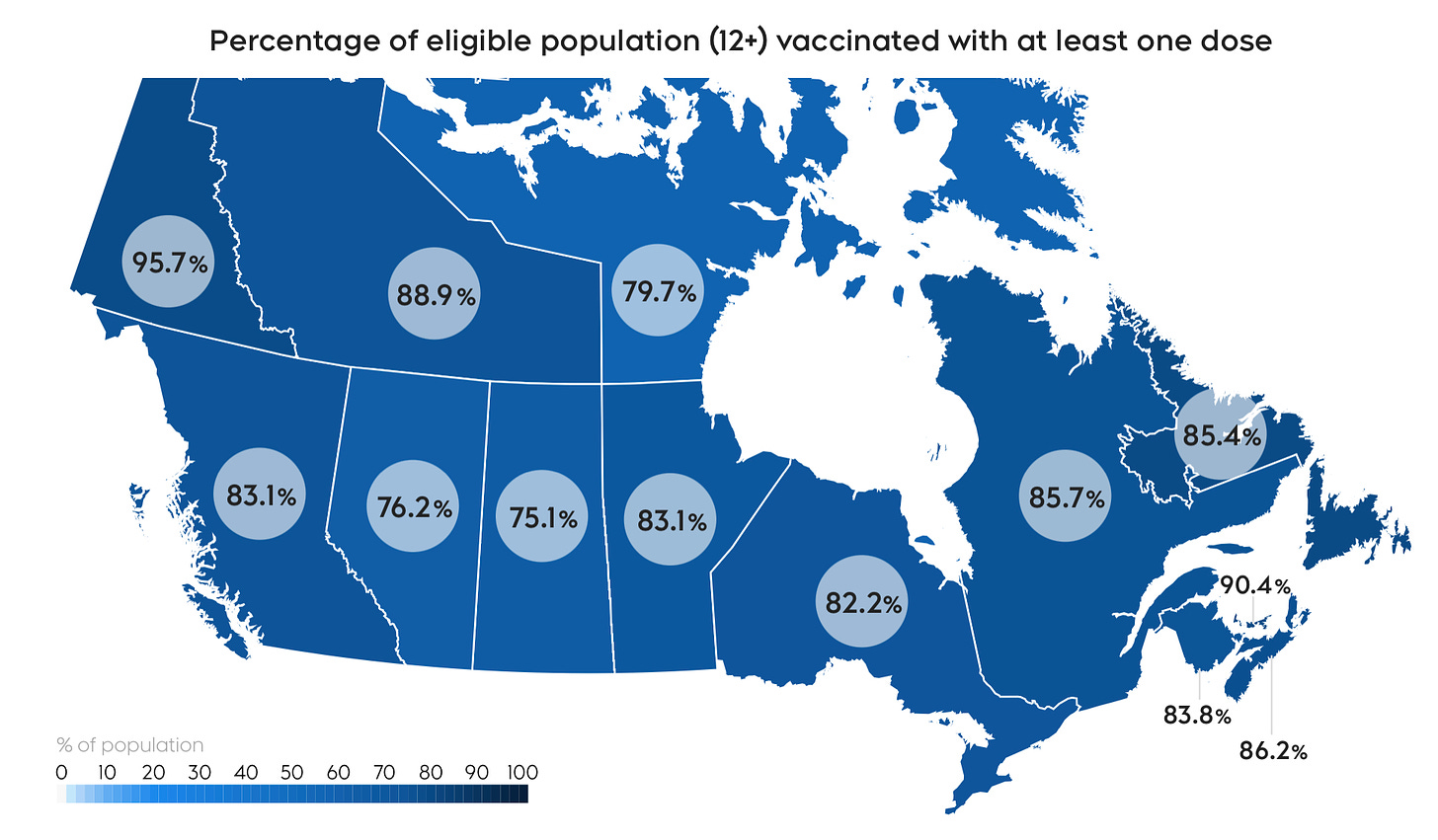Monday Morning News & Notes
For the first time in weeks Danish parishes have triggered an automatic lockdown
🇩🇰
Odense University Hospital has seen a sudden surge in COVID patients and is now reopening a ward used specifically to treat coronavirus infections. The ward was closed several months ago when infection numbers plummeted. Talking to TV2 Department of Infectious Diseases Chief Physician Anne Øvrehus says almost everyone they are treating is unvaccinated.
“If we look at the numbers, it has been a tenfold increase in ten days. Last week there was one to two, sometimes none. This week we are up to having 12. It seems that the infection has gotten a good grip on the unvaccinated, because 95% of the patients we have admitted are not vaccinated or have only just received their first shot and are not fully protected yet.”
Øvrehus says they see mostly people between the ages of 20 to 50-years-old, along with a few seniors who have underlying conditions that prevent them from being vaccinated.
The hospital has called in seven extra nurses and some other healthcare workers to staff the reopened COVID ward, a move they are hoping will just be temporary.
-
As DR is reporting this week, the Danish National Health Board will begin offering a third booster dose to a small group of vulnerable people.
Deputy Director Helene Probst spoke to the national broadcaster:
“We are already starting, probably in the coming week, with the revaccination of a small patient group. It will be of a group of people with a strongly weakened immune system. These are, for example, patients who are in active chemotherapy treatment or patients who have received an organ donation.”
Probst says it’s too early to say if or when a third dose might be rolled out to the general population. She says if the data shows a booster dose is needed, then Sundhedsstyrelsen won’t hesitate to begin a new vaccination campaign to administer a third shot.
-
Denmark has added 2,667 new infections and four more coronavirus deaths since Thursday’s update. It reported 923 infections on Friday, then 1,024 on Saturday, and then another 720 on Sunday.
The number of danish kommunes with a COVID incidence rate above 100 per 100,000 citizens is holding at 40 with 11 seeing incidence rates above 200.
For the first time in weeks, not one but two districts in Denmark have exceeded the three COVID thresholds triggering an automatic shutdown. On Saturday, Astrup Parish near Aarhus had to close all primary schools, SFOs, youth and adult education programs, sports facilities, and cultural institutions.
On Sunday it was joined by the parish of Skelund in Mariagerfjord Kommune who announced on its website as of today it too will have to enter an automatic lockdown closing schools, sports arenas, etc.
In order for either district to reopen, they must have levels under the threshold in at least one of the three parameters triggering a lockdown for at least seven straight days.
The parish of South Sjælland in Grimlinge Kommune is also toeing the line on all three thresholds and might soon become the third parish to have to lockdown. Already most of the students at Dalmose School have been sent home to isolate due to a number of infections.
An automatic lockdown happens when a district has a corona incidence rate of 1,000 or more per 100,000 residents, more than 20 new infections, and a positivity percentage exceeding three.
-
COVID hospitalizations (124) continue to rise (+9) while the number of infected people in an ICU (20) has also increased (+5) and of those the number on a ventilator (8) edged up (+1).
-
On the COVID vaccination front to date, Denmark has passed another vaccination milestone, with the number of fully vaccinated people now exceeding four million. To be exact, 4,015,787 people (68.6% of the total population) are fully vaccinated. 4,369,354 have 1st vaccine doses (74.6%).
On Saturday there were 24,264 total inoculations done and of those just 4,556 were 1st doses. The number of total second doses administered continues to close the gap in catching 1st doses.
As Danske Bank Chief Analyst Mikael Olai Milhøj notes, Denmark’s overall vaccination rate continues to decline as the number of both first and second doses administered steadily drops.
-
Region Hovedstaden is continuing its countdown of those who have yet to begin the vaccination process. Last week they managed to get another 3,300 people a first vaccine dose. Chief Medical Officer of the Nordjsjælland Hospital, Jonas Egebart, says there are now 259,700 people left in the region who have received a vaccination invitation but have yet to act on it.
-
There were no changes to the COVID risk assessment map this weekend. Danish Foreign Affairs said on Friday it is all hands on deck running around-the-clock evacuation flights out of Kabul, Afghanistan. So the current colour-coded country-by-country risk assessment is status quo until at least this coming Saturday.
🇸🇪
Some major political news from Sweden on Sunday. Embattled Swedish Prime Minister Stefan Löfven announced he’ll step down in November. Local media are reporting that Finance Minister Magdalena Andersson may take over as head of the party. If that were to happen and if she could form a new government then, Andersson would become the first ever female Prime Minister of Sweden.
Sweden is the only Nordic country to never have a female Prime Minister and ironically, it is the only Nordic country currently to not have a woman as a head of state, as is the case right now in Norway, Finland, Denmark, and Iceland.
-
Sweden doesn’t report COVID numbers over the weekend and won’t provide its first update until this Tuesday.
-
In Sweden’s Region Stockholm, hospital officials are reporting the latest infection wave is the wave of the unvaccinated. At the weekly physicians meeting it was revealed that 92% of the approximately 500 COVID patients who were admitted, treated, and discharged were not fully vaccinated. Of those, 26% had just one dose and the rest had none. The average age of the patients was 54.
Acting Director of Health and Medical Care Johan Brett:
“This clearly shows how important it is to get vaccinated with both doses of vaccine. Being fully vaccinated provides good protection against serious illnesses. For certain risk groups, even a mild illness can cause serious complications. It is clear that we now see a larger proportion of younger people being cared for at hospitals than before. This is in line with the fact that the number of cases found is now by far the highest among those aged 20–29. They are the ones who have not yet had time to get vaccinated with both doses yet. It is important in all age groups to take both doses of vaccine to avoid serious illness for their own part but also to reduce the risk of the infection spreading to relatives, friends and colleagues.”
The health authority said week over week there has been a 30% increase in hospitalizations in Sweden’s capital region. Hospitals have managed to meet the surge with increased staffing thanks in part to the end of summer holidays and healthcare staff returning from vacation.
-
Sweden is several weeks into opening up vaccinations for those aged 16 to 17 years olds, the youngest age group so far to be invited to get their shots. So far, almost 40% of the teens have had at least one dose.
🇳🇴
Norway has accrued another 1,918 COVID cases and had no new corona deaths since its Thursday update.
COVID hospitalizations (37) have gone up (+3) while the number of corona cases in an ICU (12) is unchanged and of those the number on a ventilator (6) has crept upward (+1).
To date, 70.43% of Norwegians have had one vaccine dose and 46.42% have had both doses.
-
As a new school year begins, the proportion of fully vaccinated school staff in Norway is higher than that of the rest of the country’s population. According to the National Institute of Public Health, 90.6% of all school staff (247,000 people) have one dose and 51.5% are now fully vaccinated.
Minister of Education and Integration Guri Melby:
“It is great that so many teachers and kindergarten employees want to take the vaccine. I am very happy that many municipalities have prioritized employees in kindergartens and schools also for dose two. Nine out of ten have now received the first dose, and half have received the second dose. The vaccination is important for children and employees to have a safe everyday life.”
About 25,000 employees in schools and kindergartens have not yet been vaccinated. Norway prioritized vaccinations for teachers and school staff a few months ago in preparation for back-to-school.
-
Norway has made some travel-related changes as it places entry restrictions on several countries in the European Union and some regions among its Nordic neighbours.
Norway’s Foreign Affairs Ministry has moved both Latvia and Germany from green to orange, meaning a quarantine is generally required to enter Norway.
Currently, Hungary, Poland, Romania, Slovakia, and the Czech Republic remain green countries in the EU, meaning near normal travel to Norway.
Among its fellow Nordic countries there are no longer any green regions in Sweden as Blekinge, Dalarna, Jönköping, Kalmar, Kronoberg, and Västernorrland all go from green to orange. While Gävleborg, Örebro, Västra Götaland, Skåne, and Jämtland all move from orange to COVID red zones.
Norway has designated all of Denmark’s regions either orange or red, meaning entry restrictions and quarantine requirements apply.
It has also transitioned Greenland from orange to high-risk red.
🇫🇮
Finland has registered 1,860 coronavirus infections since Thursday’s update. It reported 684 on Friday, 673 Saturday, and another 503 on Sunday.
To date, 3,947,117 1st doses (70.6% of the population) have been administered while 2,569,594 people (46.1%) have now had both vaccine doses.
-
A study by the Finnish Institute for Health has found breakthrough infections among fully vaccinated people are very rare. However, the study also found the risk increases with age.
The institute found breakthrough infections account at a rate of about 56 for every 100,000 people who have had both doses, or less than 13% of all infections recorded in people who have had one or both doses.
Chief Physician Tuija Leino says a very small portion of those breakthrough infections required hospitalization, just 53 cases among the fully vaccinated. And that is where age factored in.
“The majority of those who were fully vaccinated who had a serious illness are elderly, or over the age of 70. Nevertheless, even in the elderly, the disease is usually milder due to vaccination than without vaccination.”
Narrowing it to just seniors 70 to 79 years old, just 9% of breakthrough infections need hospital care. The number rises to nearly 30% for the same age group without vaccination and more of them became seriously ill.
-
Long-COVID cases among children in Finland are extremely rare, according to a pediatrician at the Helsinki and Uusimaa Hospital District. Speaking to YLE, Tea Nieminen said the Children's Hospital in Helsinki's Töölö district has seen very few cases of children suffering COVID symptoms long after recovering from infection.
"I can count the number of cases on one hand that have been suspected as long COVID or confirmed as such. They've all been children under the age of ten.”
-
Finland seems to be setting a high bar for any return to normal. Finnish Family Affairs and Social Services Minister Krista Kiuru, speaking to Krista Kiuru Helsingin Sanomat on Saturday, said vaccination coverage of up to 90% would be needed for a complete reopening.
"The risk in opening up is that if we don't get this fourth wave under control, we'll need even higher vaccination cover to keep society open. Right now it appears that it's very difficult to achieve coverage of more than 85%. This threat is real.”
The Finnish government has previously laid out vaccination targets of 80% to 90% for everyone 12 years and old and older.
🇩🇪
Over the weekend, the German vaccination campaign shot past the 99 million mark for total vaccinations administered. Health Minister Jens Spahn said on Twitter, “Our motto: vaccinate, vaccinate, vaccinate!"
Spahn added “The number of infections is increasing and, with the highly contagious Delta variant, so is the risk of each individual becoming infected.”
In the last update, Germany had administered 53.2 million first vaccine doses (63.9%) and inoculated 48.9 million people (58.8%) a second time.
-
Germany’s Robert Koch Institute has determined that vaccines currently in use offer very effective protection, against severe cases of COVID and death. Despite the Delta variant spreading like wildfire, the institute says its data shows only a single death due to a breakthrough infection for anyone under the age of 60. Fully vaccinated people are also a rarity in the country’s intensive care units, accounting for just 6% of coronavirus patients.
However, there’s a note of caution. The institute said up until last week a total of 13,360 breakthrough infections had been recorded. Of those, 6,927 have been registered since July 19, possibly indicating the rate is increasing.
The RKI also adds that it cannot be ruled out that "the current dynamics in both vaccination rates and infection probabilities, as well as possibly different test behavior among vaccinated and unvaccinated people, lead to distortions" in the statistics.
🇬🇧
The EURO 2020 final between England and Italy at Wembley Stadium is officially a COVID super-spreader event. On Friday, Public Health England released figures showing that about 2,300 people “were likely to have been infectious at the time of the event.” The figures from the UK health authority say a further 3,404 people both in the stadium and nearby may have become infected with COVID on game night. Officials were criticized for allowing some 67,000 people in to watch the game during the height of a new infection wave.
-
Starting Tuesday, the United Kingdom will, for the first time, begin offering coronavirus antibody tests to the general population. Anyone 18 years old and older will be able to opt-in to the program. The government-run effort is designed to try and measure the level of antibody protection across the population, both artificially induced from vaccination or acquired by having had COVID.
🇦🇺
Police in Australia arrested hundreds of people in anti-lockdown demonstrations in Sydney and Melbourne over the weekend. This as Australia records record high numbers of new daily infections, with 915 yesterday, the highest of any day yet.
🇳🇿
New Zealand’s vaunted COVID zero strategy may no longer be viable. The Delta variant has arrived on the island nation as it recorded 24 new infections on both days of the weekend. Those are the most new infection cases in the country since April 8.
COVID Response Minister Chris Hipkins said the Delta variant may force New Zealand to give its strategy a rethink.
“[Delta is] like nothing we've dealt with before in this pandemic. It does change everything, it means that all of our existing preparations begin to look less adequate and raises some pretty big questions about the future of our long-term plans.”
🌏🦠
With 25,492 new COVID infections reported yesterday, Japan has set a new record high for the most new coronavirus cases of any day of the pandemic yet.
It is not alone as the Philippines, Vietnam, and Thailand continue to see soaring numbers of daily COVID cases as well.
🇨🇦
Canada reported 2,964 infections and another six coronavirus deaths yesterday as its numbers continue to shoot back upward. The figures will also be adjusted higher once provinces who do not report on weekends table catch-up data later today.
So far, the Canadian vaccination effort has administered 27,598,352 1st vaccine doses (72.49% of the total population) while 24,687,173 people (64.84%) are now fully vaccinated.
In Ontario yesterday there were 722 new infections and two more virus deaths. That’s the first time since June 5 that daily infections in the province have exceeded 700. On Saturday, it logged 689 new COVID cases. Of the new infections reported yesterday, 564 were among people who aren’t fully vaccinated.
-
Get vaccinated or get out. The University Health Network, which operates Toronto General Hospital and the Princess Margaret Cancer Centre, said over the weekend that its employees who are not vaccinated by October 8 must take unpaid leave for two weeks. If they have not changed their vaccination status by the end of the month, then those employees will be terminated.




